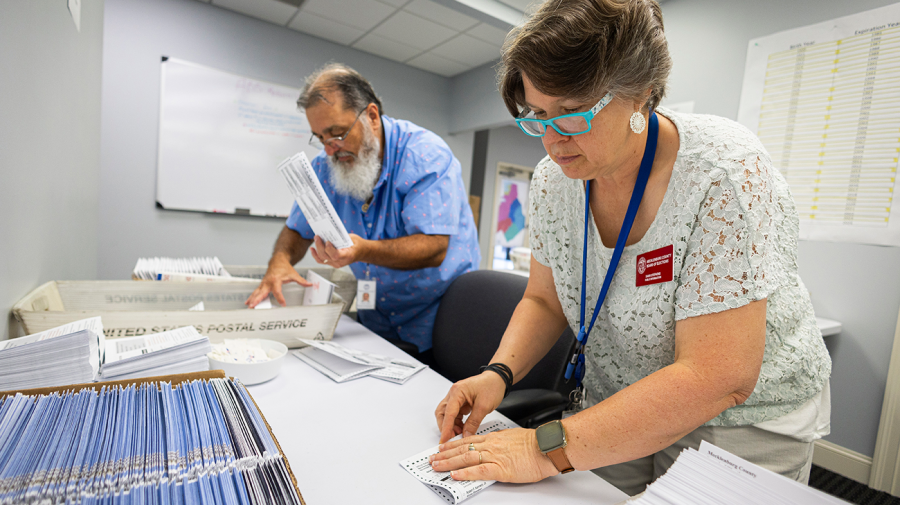Overseas voting has become the latest battlefront in Republicans’ legal challenges leading up to the election.
Judges in two crucial battleground states, Michigan and Pennsylvania, this week heard Republicans’ claims that officials are improperly accepting thousands of overseas ballots and could be opening the door to fraud.
And in North Carolina, a judge is scheduled to hold a hearing Monday in a similar case.
State election officials are pushing back, insisting they are complying with legal requirements and warning the lawsuits are part of a broader campaign to sow the seeds for postelection challenges.
Overseas ballots make up a relatively small portion of the electorate: Officials counted nearly 890,000 nationwide in 2020, according to data from the federal Election Assistance Commission.
But the group could make a sizable impact as polls show a razor-tight presidential race in critical battlegrounds with just more than two weeks until Election Day.
The series of new legal challenges comes as the voting bloc — which comprises uniformed service members stationed abroad, their families and U.S. citizens living overseas — is viewed as increasingly Democratic.
Federal data shows that in recent election cycles the share of overseas citizens has made up a larger proportion than the military ballots.
Now, both parties are attempting to win over the group. The Democratic National Committee in August announced it was for the first time making a six-figure investment in such turnout efforts. And last week, Trump announced a campaign proposal to end the double taxation of Americans living overseas.
Trump is meanwhile insisting without evidence that Democrats are using overseas ballots to engage in mass election fraud. Trump often accuses Democrats of widespread voting fraud despite there being no proof that exists.
“The Democrats are talking about how they’re working so hard to get millions of votes from Americans living overseas. Actually, they are getting ready to CHEAT!” Trump wrote on Truth Social last month.
Cleta Mitchell, an attorney involved in Trump’s efforts to overturn the 2020 election results, similarly posted Friday on the social platform X, “This is a VERY big problem that a GOP Congress with a Pres Trump must fix next year.”
Under the federal Uniformed and Overseas Citizens Absentee Voting Act (UOCAVA), states must provide eligible Americans living abroad the ability to vote absentee, including by accepting a postcard application for voter registration and ballot requests.
Republicans’ lawsuits in North Carolina and Michigan claim that officials there are extending overseas voting protections to people who fall outside of UOCAVA’s scope.
Both states permit overseas citizens who have never lived there to cast a ballot as long as they aren’t registered elsewhere and their parents or guardians were eligible to vote in the state.
Michigan Judge Sima Patel held a nearly 90-minute hearing Thursday in Republicans’ suit. She suggested their “biggest hurdle” was how long they waited before filing the case.
Brandon Debus, an attorney representing the Michigan Republican Party, told the judge the issues weren’t apparent until recently.
“This was not an intentional or strategic delay. There would be no purpose for doing that, because it is a hurdle,” he said.
In Pennsylvania, which has sent out 25,000 ballots this year, six Republican congressmen from the state have filed a lawsuit asking to segregate overseas ballots this election.
The plaintiffs comprise GOP Reps. Guy Reschenthaler, Dan Meuser, Glenn “GT” Thompson, Lloyd Smucker, Mike Kelly and Scott Perry. Rep. Brian Fitzpatrick (R-Pa.), a moderate, did not join, and the Republican National Committee has not gotten involved.
As opposed to the lawsuits in other states, the Pennsylvania challenge revolves around election officials exempting overseas voters’ ballots from certain verification steps the congressmen claim are required by federal law. Foreign nations could “easily submit falsified” ballots, the congressmen claimed in their complaint.
“Defendants’ disregard for the law creates an opportunity for inclusion of ineligible ballots such that the ultimate tally of the votes may not accurately reflect the legal results which could affect a close Congressional election — an injury to Plaintiffs,” the complaint reads.
Attorneys for Pennsylvania Secretary of State Al Schmidt (D) say the lawsuit conflates various provisions and “rests on their own confusion,” because overseas voters are exempt.
“Plaintiffs may not like the fact that the Election Code exempts UOCAVA-covered voters in this manner. But that does not create a federal cause of action or any claim against the Secretary. Current law simply does not provide for the processes that Plaintiffs appear to seek,” Schmidt’s attorneys wrote in court filings.
U.S. District Judge Christopher Conner, an appointee of former President George W. Bush, held a hearing Friday on the Republicans’ request for an order blocking the state’s guidance. The Democratic National Committee (DNC) and its state arm are attempting to intervene to defend Schmidt.
The DNC and Schmidt’s office both asserted the congressmen have no legal standing and that they waited too long to bring their lawsuit.
“The Court cannot even reach the merits, because there are multiple threshold defects with the complaint that foreclose plaintiffs’ last-minute request to disenfranchise military and other Pennsylvania voters — and that make clear that this lawsuit is really an effort to sow public doubts about the election,” the DNC wrote in court filings.
John Jones, who preceded Conner as chief judge of the U.S. District Court for the Middle District of Pennsylvania, said during a briefing with reporters last week that the case is “emblematic” of the lawsuits he presided over during the 2020 election that he believed were aimed at voter suppression.
“This is my opinion, but I think one of the things that Judge Conner is going to struggle with in that case, very likely, is why it was filed so late when presumably this information existed before,” said Jones, who now is president of Dickinson College.
